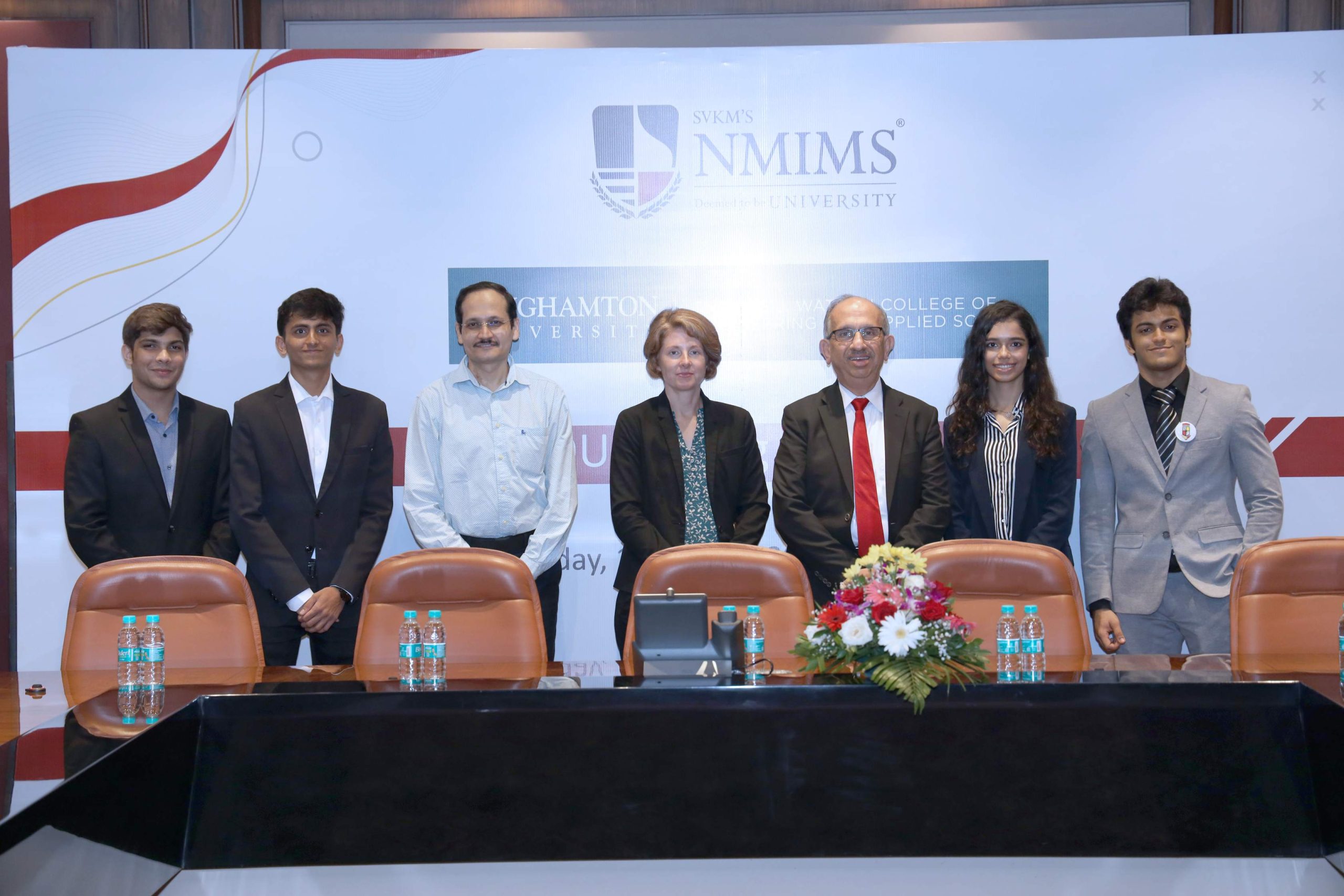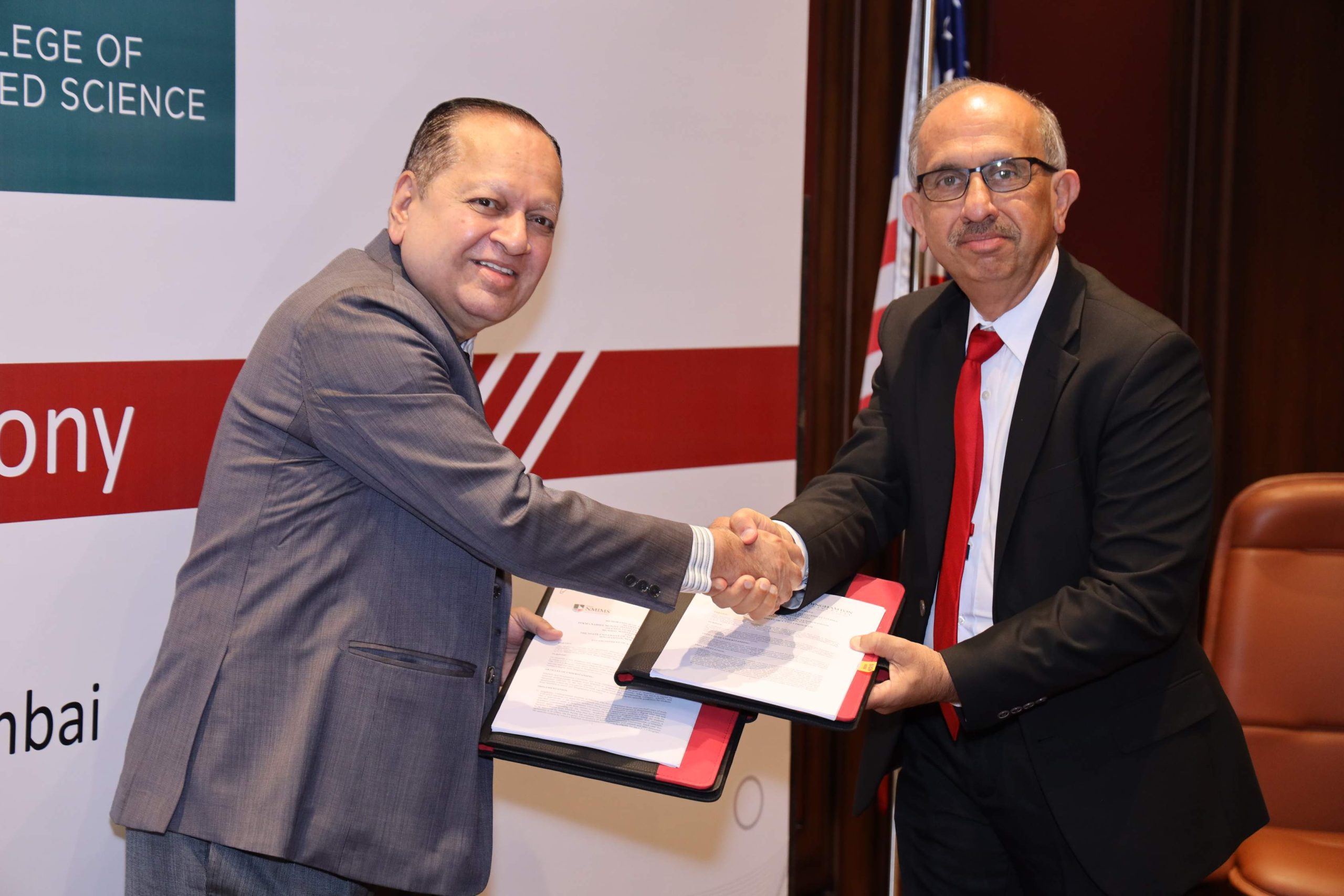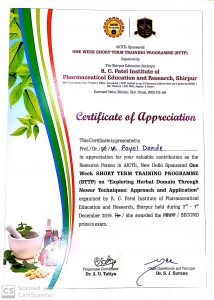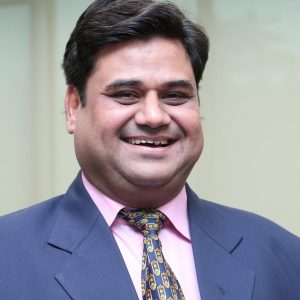The post NMIMS and Binghamton University Forge Pathbreaking Collaboration to Enrich Engineering Education appeared first on SPANDAN e-Magazine.
]]>
The importance of a multicultural experience and the development of soft skills cannot be overstated in today’s competitive job market. Engineering graduates who possess technical expertise and the ability to work seamlessly in diverse environments are in high demand. The NMIMS-Binghamton University collaboration recognizes this need and is designed to promote these critical skills, ensuring that students emerge not only as accomplished engineers but also as well-rounded individuals prepared for the challenges of the global workforce.
The most exciting aspect of this partnership is the introduction of the collaborative 3.5+1.5 degree program, which signifies the start of a new era in academic and research collaboration between Binghamton University and NMIMS. Under its purview, students from NMIMS will spend three and a half years studying at NMIMS and the entire last semester of one and a half years at Binghamton University. Upon completion of the program, they will receive a Bachelor’s degree from NMIMS and a Master’s degree from Binghamton University.
The engineering school at NMIMS has always placed great emphasis on providing students with applied knowledge. To attain this objective, the curriculum was revamped a few years ago, with the first batch of students following this revised curriculum in their fourth year now. One notable change is that the final semester now offers students the flexibility to either work with a company or engage in a research project during their last semester in addition to their regular summer internships. With this revised curriculum, NMIMS also aims to cultivate global citizens apart from honing their applied knowledge.
This visionary program opens doors to many advantages for students, including undertaking research projects, taking master-level courses relevant to their specializaton, getting exposure to diverse learning environments, and the invaluable gift of gaining a global perspective. In this agreement, students can opt to pursue their master’s at the partner university. In such a case, the additional courses undertaken will speed up their master’s journey. Moreover, the courses can also carry significant value if a student opts to pursue a master’s degree at a different university.
By blending academic rigour with international exposure, this partnership will not only enrich the NMIMS students’ experience but also promise to empower them as global citizens equipped to confront complex engineering challenges with confidence and expertise.
Dr Sharad Mhaiskar, Pro VC at NMIMS, emphasized, “Our partnership with Binghamton University is a transformative step in engineering education, equipping our students with the skills and perspectives needed to thrive in a multicultural and interconnected world. At NMIMS, we always strive to give our students a holistic experience. This collaboration will be enriching by broadening their horizons as they enter the professional world.”
Dr Krishnaswami Srihari, Dean Thomas J. Watson College of Engineering and Applied Science State University of New York, Binghamton University, shared the excitement, stating, “It has become imperative for students to have a global mindset in today’s world. This program exemplifies our dedication to nurturing global perspectives among engineering students along with technical and applied knowledge. We eagerly await the first cohort to visit our university for a rewarding and fulfilling experience.”
NMIMS is endeavouring to create more such opportunities for its students through international collaborations, with Binghamton University setting the tone for future partnerships. The aim is to foster global citizenship and provide students with a strong foundation of applied knowledge and multicultural experience, ultimately preparing them to excel in their professional careers.
The post NMIMS and Binghamton University Forge Pathbreaking Collaboration to Enrich Engineering Education appeared first on SPANDAN e-Magazine.
]]>The post Leading the Way: ISA MPSTME Student Section Recognized as First in India and Asia Pacific to Receive Student Section Excellence Award appeared first on SPANDAN e-Magazine.
]]>ISA, the International Society of Automation, recognizes outstanding contributions by individuals and member groups. The Executive Board confers these recognitions upon recommendation from established selection committees. The Student Section Excellence Award reflects the remarkable achievements of the ISA MPSTME Student Section in advancing the mission of the society.
The Student Section Excellence Award recognizes the remarkable efforts and achievements of the student leaders and members of the ISA MPSTME Student Section. By organizing successful events and competitions such as the India Automation Games and ARS Automatika, the student section showcased their talent and innovation. These events provided a platform for students from all corners of the country to come together and present solutions that exceeded the set criteria.
Prof. Dattatray Sawant, the Faculty Advisor of ISA MPSTME, played a pivotal role in guiding the student leaders to success. With his profound expertise in automation and control systems, Prof. Sawant provided valuable insights and strategic direction, ensuring the section’s activities aligned with ISA’s mission and objectives. His mentorship inspired student leaders to think innovatively and develop impactful initiatives. Prof. Sawant’s collaborative approach also facilitated strong connections with industry professionals and academic institutions, expanding the student section’s network and opportunities for growth.
The ISA MPSTME Student Section had an exceptionally fruitful year, receiving well-deserved recognition and achieving remarkable milestones. They were awarded the Best Student Section at PPPA 2023, along with the Best Student Leader Male and Best Student Leader Female. Students Adan Amir and Siddharth Bangera earned prestigious scholarships while hosting the India Automation. Furthermore, Kartik Devani and Prof. Dattatray Sawant were shortlisted for the esteemed World Automation Games. Prof. Sawant’s design patent for the “OMNIDIRECTIONAL SPHERICAL ROBOT” further highlighted his innovative contributions to automation.
The recognition of ISA MPSTME with the Student Section Excellence Award signifies a significant milestone for the student body, members, and the entire institution. It acknowledges their hard work, dedication, and exceptional contributions to the field of automation. This accolade will enhance the visibility and credibility of the student section, attracting more students, faculty, and industry professionals to collaborate on future events and workshops. The award opens doors to expanded networking opportunities, industry connections, and potential sponsorships, enabling ISA MPSTME to host more impactful events.
Dr. Alka Mahajan, Dean, MPSTME, said, “We offer a unique and transformative learning environment that prepares students to excel on a global stage. Through our collaborations, industry partnerships, and international exposure, we provide students with the opportunity to engage with diverse perspectives, gain global insights, and develop the skills necessary to succeed in the international arena. This recognition by ISA USA further highlights the global impact of our students and reinforces our commitment to fostering innovation and excellence in automation. We are proud to provide a platform that empowers our students to become future leaders in the field.”
Siddharth Bangera and Adan Amir, students from B Tech Mechatronics shared their views on the momentous occasion by saying, “Receiving such recognition from a renowned international organization like ISA USA signifies the exceptional achievements and dedication of the student section. The prestigious scholarship evokes feelings of pride, joy, and satisfaction among the members of the student section. Prof. Dattatray Sawant, as the faculty advisor of the ISA MPSTME Student Section, made significant contributions to the success of the student section through
his guidance, support, and expertise. It validates our hard work, leadership, and collective efforts in promoting the goals of ISA and advancing the field of automation. It also serves as motivation to continue their endeavours with even greater enthusiasm and dedication.”
The post Leading the Way: ISA MPSTME Student Section Recognized as First in India and Asia Pacific to Receive Student Section Excellence Award appeared first on SPANDAN e-Magazine.
]]>The post Impact of COVID19 on NGOs and Social Enterprises appeared first on SPANDAN e-Magazine.
]]>This shift coupled with COVID 19 crisis is likely to have an unintended impact on the functioning of developmental organizations in the near future. To examine this aspect the Jasani Centre of Social Entrepreneurship & Sustainability Management, NMIMS conducted an online study on ‘Impact of COVID19 on NGOs and Social Enterprises’.
The study was based on 30 NGOs, not for profit and for-profit social enterprises operating in Maharashtra. From this 43 % were from rural areas, 46 % from urban areas, and rest were operational in both urban and rural areas. The key priority areas of their interventions comprised of education, health, skill development, child welfare, economic empowerment of women, environmental conservation, rural & urban community development, and working with differently-abled.
Contributions Made
With the changed context of the COVID-19 pandemic, a little over 90 % of NGOs and social enterprises have pivoted rapidly to respond to different and additional needs of local communities. Around 67 % of organizations were able to mobilize resources to provide relief measures. Social enterprises like Green India Initiative Pvt Ltd, Unity Group, Ecoexist, Srujna Charitable Trust, The Aangan Trust, Renovate India, Need Vikas Sanstha, Mann, Child Health Foundation, CCDT and Childline provided groceries and sanitation kits to people staying on streets, daily wage earners and migrants. Around 50 % of organizations in the study were found to be engaged in taking care of the basic requirements of the vulnerable communities. Some NGOs collaborated with government and corporates to avoid duplication of service and ensured that the essentials reach the affected communities.
Besides the distribution of grocery, one-third of organizations were engaged in creating community awareness for personal hygiene, community sanitation, raising resources, providing important medical information to communities. For instance, Watawaran was engaged in disseminating information about the food distribution system and other schemes in simple languages in rural areas of Maharashtra.
Organizations working in education in rural Maharashtra like Shivaji Rao Deshmukh Group of Institutes provided masks and sanitizers to government staff. Life Supporters Institute of Health Sciences (LIHS) is engaged in supporting Ambulance operators with designing SOPs for handling COVID19 patients and sanitization of the ambulance after the call. Childline coordinators also assisted government authorities to provide tele-counseling to suspected patients quarantined at homes.
Impact
It is an undisputed fact that the development sector across the globe is facing a critical threat from the pandemic. But, in India as our NGOs and social enterprises lack contingency planning the impact would be felt more. 83% of organizations reported that due to COVID19 their organizations’ work has been significantly impacted. Executives reported that the lockdown has impacted their project operations and they are sure of having financial challenges ahead. The financial and operational risk burden has fallen disproportionately on the NGOs and social enterprises. The implications of this for cash flows are critical at this time. A little more than one-third of executives stated that managing costs of running the organization, payment of staff salaries, early closure of projects, scaling down projects, delays in starting new projects are some of the many problems which social sector organizations will have to face now. Some are contemplating reducing the staff size, but that would be catastrophic to the organization. As their capacity to respond to both the immediate as well as long term needs which are likely to escalate as a result of this pandemic will be impacted.
Akhandjyoti Eye Hospital’s health operations were severely impacted as patients were unable to reach the hospital. Remote counseling of cases of child abuse and domestic violence was a big challenge for organizations like Arpan and Child Aid Foundation. Srujna’s livelihood support activities have been severely impacted and increased the economic vulnerability of poor women. Another important concern expressed by for-profit social enterprises like Awaaj, Ecoexist enterprises, Green India Initiative Pvt Ltd is related to business continuity and gaining market access as the spending patterns would now significantly differ. By and large, executives expressed that they are worried about the safety of their staff to work in slums and high-risk areas. Hence, a few organizations are now engaged in devising their service delivery strategy.
The colossal economic downturn implies an impact on future aid assistance. More than 50 % of executives feared that they may experience a reduction in grant in aid support from the government as well as corporates due to funds getting diverted to COVID19 relief and rehabilitation activities. The economic crisis is expected to limit both capacity and availability of donors and investors. Development organizations will have to re-think and redesign their business model to diversify their income and create a sustained impact.
Expectations: Government
To enable NGOs and social enterprises to function effectively and address the challenges created by COVID19, respondents shared that there is a need for developing new ideas and innovative solutions in the area of health care, livelihood support, and provision of energy. These solutions can evolve through cross-sector collaboration between development organizations, government, and corporates. It was echoed by almost all respondents that governments at all levels can play a key role in promoting these partnerships.
Almost 80 % of the executives shared that governments should design an innovative financing model for NGOs and social enterprises. Proposed solutions include the provision of an anticipatory financing mechanism like the provision of soft loans to social enterprises to raise finance in advance to address immediate needs, establishing an NGO Liquidity Fund for enabling NGOs to cover overheads during critical periods and payback over a period of time. Additionally provision of tax relaxations and that of demand-led grant in aid support were recommended. As development organizations work in high-risk environments there is a need to design risk-sharing models so that they will not be forced to shoulder the burden of financial risk all by themselves; rather it should be shared with donors/investors equally well.
The post Impact of COVID19 on NGOs and Social Enterprises appeared first on SPANDAN e-Magazine.
]]>The post Oral Presentation Award @IIT Guwahati to SPTM Hyderabad Faculty appeared first on SPANDAN e-Magazine.
]]>He has been awarded Second Prize with a Certificate.
We congratulate Dr. Kapil Kumar for this achievement!!!
The post Oral Presentation Award @IIT Guwahati to SPTM Hyderabad Faculty appeared first on SPANDAN e-Magazine.
]]>The post Digital Transformation-Smart Contracts for Transactions Executed in Blockchain Platforms by Dr. Paritosh Basu appeared first on SPANDAN e-Magazine.
]]>The post Digital Transformation-Smart Contracts for Transactions Executed in Blockchain Platforms by Dr. Paritosh Basu appeared first on SPANDAN e-Magazine.
]]>The post Structural and clinical impact of anti-allergy agents: An overview appeared first on SPANDAN e-Magazine.
]]>This is a collaborative outcome of School of Pharmacy & Technology Management, Hyderabad Campus with the School of Pharmaceutical Sciences, Apeejay Stya University, Gurgaon, Haryana.
The link of the article is https://www.sciencedirect.com/science/article/pii/S0045206819313239
We congratulate Dr. Kapil Kumar, Assistant Professor (Pharma Sciences), SPTM – Hyderabad Campus and co-author for this achievement!
The post Structural and clinical impact of anti-allergy agents: An overview appeared first on SPANDAN e-Magazine.
]]>The post Dr. Payal Dande’s achievement at AICTE sponsored STTP course appeared first on SPANDAN e-Magazine.
]]> The course was conducted for one week which had daily assignments and certification exam at the end of the training programme.
The course was conducted for one week which had daily assignments and certification exam at the end of the training programme.
She was awarded with a Certificate of Merit and Trophy by the organizing committee.
We congratulate Dr. Payal Dande for this achievement!
The post Dr. Payal Dande’s achievement at AICTE sponsored STTP course appeared first on SPANDAN e-Magazine.
]]>The post Human Social Responsibility (HSR): Donating Organs – Living Beyond Life! by Prof. Dharmendra Sharma appeared first on SPANDAN e-Magazine.
]]> (The Indian scenario and the basics of organ donation)
(The Indian scenario and the basics of organ donation)
Despite the technological advancements the source of human organs is the donation only. Organ donation is one of the greatest medical astonishments of the century which has saved the lives of several patients. The first organ transplant of India was a kidney transplant performed in the 1970s. Currently around 5000 kidneys, 1000 livers, and around 50 hearts are transplanted annually in India, against the need of roughly 2,00,000 kidneys, 50,000 hearts, and 50,000 livers for transplantation each year. In fact there is a tremendous lack of awareness about organ donation in the country and the disparity between the huge demands for the organs and their poor supply is a major concern. If we look at the statistics……
- There is a poor organ donation rate – 0.26 per million in India, compared to some of the better performing countries such as Croatia’s 36.5, Spain’s 35.3, and America’s 26 per million, respectively.
- With 1 per million‑donation rate, India would take care of almost all current demands for organs.
- At a 2 per million‑donation rate there would be no necessity to undertake living kidney donations.
The total organ donation shortage in our country can be met even if only few victims involved in fatal accidents serve as organ donors.
We can categorize the organ donors into three categories:
- Living donors
- Brain death donors or Cadaver donors
- Natural death donors.
When a living person decides to donate his or her organ(s) to someone in need of a transplant is called living donor. They are usually family members or close friends of that person who needs a transplant. They have to fulfil certain medical criteria and have to undergo comprehensive medical testing as required by the particular circumstance before being accepted as suitable donors.
When organs from a brain-dead individual are transplanted into the body of a living recipient is called brain death donor or cadaveric donor. This kind of transplant initially requires the recipient to wait on a list until a suitable organ is available based on the recipient medical profile. The following organs can be donated by a brain death patient: kidney, liver, heart, lungs, pancreas, intestine, tissues, cornea, bones, skin, and veins. A person after his or her natural death can donate their eyes and skin.
Donated organs can remain viable for transplantation for a duration ranging from a few to many hours, although it is best if they are transplanted as quickly as possible after the donation surgery. Typical storage times are 30 h or less for a kidney, <12 h for a pancreas or liver, and <6 h for a heart or for lungs. These times vary because of the relative speed at which deterioration begins in the organ’s tissues.
This is the irony of our nation that due to the lack of awareness in India, the majority of people do not take up this noble cause for the benefit of others. The total number of brain deaths due to accidents is nearly 1.5 lakhs annually. There is a need of two lakh kidneys, 50,000 hearts and 50,000 livers for transplantation every year. Even if 5%–10% of all brain deaths are harvested properly for organ donation, technically, there would be no requirement for a living person to donate organs.
The situation of organ wastage is the most severe in cases of hearts. Due to various issues such as cost and availability of expertise in different cities, hearts are often wasted in India.
Transplantation of Human Organs Act was passed in 1994. It defines about the regulation of removal of human organs and its storage. It also arrived at the regulation of transplantation of human organs for therapeutic purpose and for the prevention of commercial dealings in human organs. The main provisions of the act (including the amendments and the rules of 2014) are as follows: 1. Brain death identified as a form of death process and criteria for brain death for brain death certification defined 2. Allows transplantation of human organs and tissues from living donors and cadavers (after cardiac or brain death) 3. Regulatory and advisory bodies for the monitoring transplantation activity and their constitution defined 4. The government shall maintain a registry of the donors and recipients of human organs and tissues.
Any person willing to donate his/her organs can do so by filling out the donor consent form 1. This is a voluntary act 2. The donor may also approach a transplant center or other organ 3. Donation organizations for a donor card 4. The decision to donate organs could also be done by the lawful custodian 5. Of the body after the death of the patient.
We can help the humanity by spreading awareness in the society about organ donation, by pledging our organs and by motivating our near and dear ones to pledge their organs. Lets be a responsible citizen by performing our Human Social Responsibility and Live beyond life!
Article by, Prof. Dharmendra Sharma
Management Trainer and Visiting Faculty with B Schools in India,
Director, NMIMS Business School Alumni Association
Director, Rotary Club of Bombay West,
President Nominee 2022-23, Rotary Club of Bombay West.
District Chair for Organ Donation Awareness. Rotary District 3141
Peace Volunteer & Member of Peace Committee Rotary District 3141.
Life Member, Public Relations Society of India (PRSI)
Email: sharmadharm@gmail.com
The post Human Social Responsibility (HSR): Donating Organs – Living Beyond Life! by Prof. Dharmendra Sharma appeared first on SPANDAN e-Magazine.
]]>The post Control of Oncogenic Expression of HPV in Cervical Cancer Cells by an Evidence Based Tribal Medicine appeared first on SPANDAN e-Magazine.
]]>The title of his presentation was “Control of Oncogenic Expression of HPV in Cervical Cancer Cells by an Evidence Based Tribal Medicine”.
The conference was organized jointly by International Union of Basic and Clinical pharmacology (IUPHAR) & Indian Pharmacological Society.
In this conference, around 350 papers were presented and the paper presented by Mr. Saurabh Maru was well appreciated by the delegates and the judges.
We congratulate Mr. Saurabh Maru and co-authors for this achievement!
The post Control of Oncogenic Expression of HPV in Cervical Cancer Cells by an Evidence Based Tribal Medicine appeared first on SPANDAN e-Magazine.
]]>